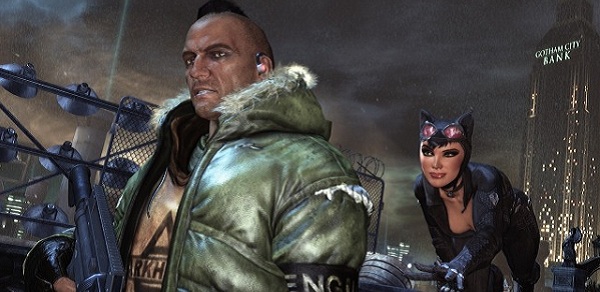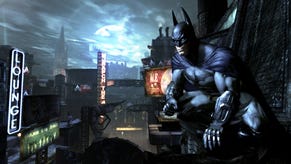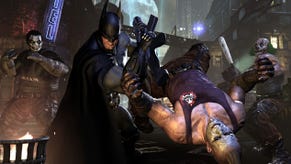Important Dialogue Analysis: Arkham City
How much blood could a dead cat bleed if a dead cat could still bleed?
"You're going to bleed like a dead cat."
At first, I thought this was just clunky dialogue, some poor writer struggling to come up with yet another cat-based reference for Batman: Arkham City's thugs to bellow at Catwoman, as a break from the rather more disturbing threats and insults they so frequently offer. Many have commented that the game's dialogue, especially incidental comments from thugs, is unimpressive. And sometimes troubling too. Puzzling, given how lavish and polished the game is in almost all other respects. Then I sat down and thought about it properly. What if there was something I was missing? What if that line, "you're going to bleed like a dead cat" was rich in subtext and nuance I was just too ignorant and lazy to pick up on? And what if, in turn, that meant all the apparently wretched incidental dialogue in the game had been misinterpreted? What if we'd made a terrible mistake? There was only one thing I could do - a careful, stage by stage analysis of the sentence in question. Only then could I truly uncover its mysteries. Some might ask why this game, of all games, should be subjected to such painstaking analysis. I have one word that perfectly addresses all such queries: "because."
First let's look at the context. These thugs are fighting Catwoman - a woman who dresses like a cat, and frequently makes easy cat gags in public, just in case we hadn't picked up on what her disguise was supposed to be. So, the first nuance I've deciphered is a simple one, though it does require some reading between the lines. Superficially, the line is "you're going to bleed like a dead cat", an apparent threat of dire violence, but a far more important statement is actually hidden within that:
"You're... like a... cat."
Aha! The truth begins to move into focus. This, I now realise, is the thugs acknowledging to Catwoman that they understand what her outfit and name is intended to convey. Of course, the thugs are in actual fact addressing us, the player - this line can be heard very early in the game, in the introductory fight wherein Catwoman, not Batman, is the playable character. It is entirely possible that someone has bought this game not already being familiar with the Batman mythos (perhaps they've only seen the Christopher Nolan movies; perhaps they just bought Arkham City because they like bats and/or cities), therefore the thugs' veiled description of what Catwoman is supposed to evoke is a very clever example of stealth exposition. If they hadn't noted for those not already familiar with a comic character created in 1940 that Catwoman was like a cat, we would have a needed a long, expository cutscene of the kind we all despise where this was spelled out brazenly. This is remarkable scene-setting and storytelling: straight to the point, all in just one line.
Next, I turned to the other major element of the mysterious sentence. "You're going to bleed." This took me a while to figure out - it was just a straight threat, right, and not a particularly threatening one at that? Then I realised, once again, that the first time this line can be heard is in that first fight. What if a new player didn't realise it was a fight? After all, this is the scene we're presented with:
Of course! The ring of onlookers, the central figure in a dramatic pose: there is a very real risk that someone might believe, at this stage, that Catwoman is there for a dance-off, or perhaps some sort of body-popping constest. An overt reference to bleeding means the player will now grasp that this is not, in fact, a boogaloo situation, but a violent situation. Again, context is achieved without the need for exposition. I was becoming very impressed indeed by this stage.
The third and, as far as my own attempt at deconstruction could uncover, final element of the sentence was the one that had me stumped for longest. "Bleed like a dead cat."
This is why I initially couldn't understand why so apparently banal a line had been approved, in the same way the likes of "your mummy won't know who are you when we're done", "you gonna miaow for me?" and the blinder that it is "eh, Catwoman! We're gonna kick the crap outta you!", uttered again and again and again from men who sounded like they all had bunged-up noses, simply seemed, until now, to be poor-quality, obvious and unimpressive Generic Thug dialogue.
Here's the thing about dead cats: they don't bleed. They have very much ceased to bleed, in fact. "You're going to bleed like a cat that has been very seriously wounded, or perhaps has only just this moment died and is still spurting a bit of blood due to residual pumping" would make more sense, but it's even less elegant than what the game had settled on. "You're going to bleed like a cat with a particularly nasty papercut" might have been stronger, but then that's not a very thug-like threat, is it?
Then I got it. The thugs didn't really mean "you're going to bleed." That's just the obvious interpretation an uneducated idiot would draw from the line. Their true message was "you're not going to bleed any more ever again, in the same way that a dead cat that has already experienced rigor mortis and thus is no longer capable of any form of hemorrhaging cannot bleed. That is how dead you're going to be, Catwoman - so dead that bleeding is no longer even a possibility." Now that is a dire threat indeed. And all that sinister meaning while also including a cat reference. I'm not ashamed to admit it: I applauded.
Genius in its simplicity, and I can't believe I was too blind to pick up the many deft undertones hidden within "you're going to bleed like a dead cat." I am quite sure the same artfulness can be found in every apparently dodgy line in the game.
Join me next week for my 5000 word analysis of the many important differences between "You're gonna die in Arkham City" and "Arkham City is where you're gonna die", and the societal commentary the game intends when it utters these lines within seconds of each other.



















